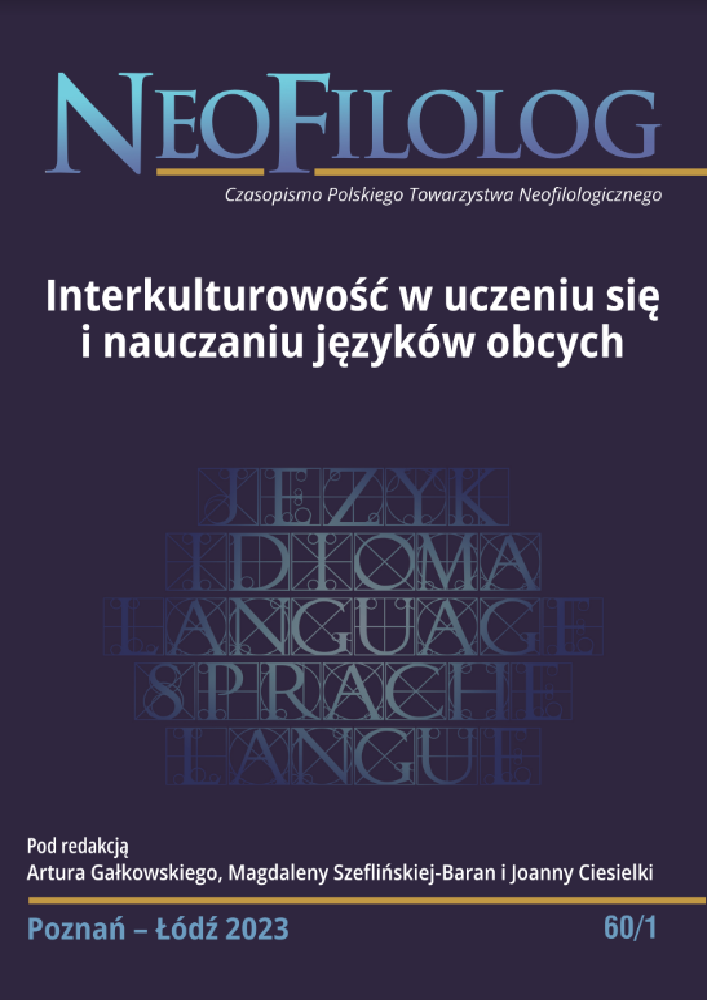Résumé
Intercultural communicative competence in Russian word stress acquisition refers to effective and appropriate management of interaction in various conversational situations that require specific orthoepic habits in the area of contemporary Russian accentual system. Every natural communicative situation needs informal, spoken language rather that standard Russian taught in classroom environment. Therefore, contemporary spoken Russian with its accentual characteristics needs to be examined. The research conducted on the group of Russian, Belorussian and Ukrainian youtubers indicates that the analyzed speech contains some specific derivatives which are characteristic of colloquial Russian: semelfactive verbs and their past participle forms with stressed suffix -ну́(ть)/-ану́(ть), masculine derivatives with stressed suffix -о́с, neuter nouns with the suffix -ов(о)/-ев(о), masculine nouns with the stressed suffix -а́к/-я́к, -а́н/-я́н, -о́н, feminine nouns with an accented suffix -у́х(а)/-ю́х(а), deverbal nouns with suffix -ёж, diminutives with suffixes -чик, -у́шк(а)/-ю́шк(а), -а́шк(а)/-я́шк(а), relational adjectives with stressed suffix -о́в(ый). Furthermore, there is no significant difference between Ukrainian, Belorussian and Russian analyzed material in terms of accentuation apart from one tendency, which does not seem to appear in Russians’ speech. Ukrainians and Belorussians tend to stress root in short verbs of past tense feminine forms.
Références
Bartoszewicz A. (1987), Zagadnienia ewolucji współczesnego języka rosyjskiego. Warszawa: PWN.
Byram M. (2002), The Routledge encyclopedia of language teaching and learning. London: Routledge. DOI: https://doi.org/10.4324/9780203219300
Council of Europe: Coste D. i in. (2003), Europejski system opisu kształcenia językowego: uczenie się, nauczanie, ocenianie. Warszawa: CODN.
Efremova T.F. (2000), Novyj slovarʹ russkogo âzyka. Tolkovo-slovoobrazovatelʹnyj. Moskva: Russkij âzyk.
Efremova T.F. (2010), Orfografičeskij, slovoobrazovatelʹnyj, morfemnyj slovari russkogo âzyka. Moskva: Astrelʹ.
Fantini A.E. (2012), Language: an essential component of intercultural communicative competence, (w:) Jackson J. (red.), The Routledge Handbook of Language and Intercultural Communication. London-New York: Routledge, s. 263-278.
Fedânina N.A. (1976), Udarenie v sovremennom russkom âzyke. Moskva: Russkij Âzyk.
Filin F.P. (1973), O strukture sovremennogo russkogo literaturnogo âzyka. „Voprosy âzykoznaniâ”, nr 2, s. 3-12.
Kalenčuk M.L., Kasatkin L.L., Kasatkina R.F. (2017), Bolʹšoj orfoèpičeskij slovarʹ russkogo âzyka. Literaturnoe proiznošenie i udarenie načala XXI veka: norma i ee varianty. Moskva: Ast-Press.
Kapanadze P.A. (1984), Sovremennoe gorodskoe prostorečie i literaturnyj âzyk, (w:) Zemskaâ E.A., Šmelev D.N. (red.), Gorodskoe prostorečie. Problemy izučeniâ, Moskva: Nauka, s. 5-12.
Karaulov Û.N. (red.) (1997), Russkij âzyk. Ènciklopediâ. Moskva: Drofa.
Kiseleva L.A. (2009), Gorodskoe prostorečie. 25 let spustâ. „Journal of Siberian Federal University. Humanities & Social Sciences. Supplement”, nr 2, s. 68-77.
Koriakowcewa E. (2014), Słowotwórcze zasoby nowych stylów funkcjonalnych w językach słowiańskich. „LingVaria”, nr IX, s. 9-33. DOI: https://doi.org/10.12797/LV.09.2014.17.01
Kudinova T.A. (2009), Prostorečie kak lingvističeskij fenomen: dinamika ponâtiâ. „Naučnaâ myslʹ Kavkaza”, nr 4, s. 135-138.
Olechnowicz M. (1974), Teoretyczne zasady dystrybucji rosyjskiego akcentu wyrazowego. Wrocław: Zakład Narodowy im. Ossolińskich.
Valgina N.S. (2003), Aktivnye processy v sovremennom russkom âzyke. Moskva: Logos.
Warchala J. (2003), Kategoria potoczności w języku. Katowice: Wydawnictwo Uniwersytetu Śląskiego.
Zaliznâk A.A. (2008), Grammatičeskij slovarʹ russkogo âzyka. Moskva: Ast-Press.
Zaliznâk A.A. (2010), Trudy po akcentologii. Moskva: Âzyki Slavânskih Kulʹtur.
Licence
© Joanna Woch 2023

Ce travail est disponible sous licence Creative Commons Attribution - Pas de Modification 4.0 International.
Auteurs :
Les auteurs de textes acceptés pour publication dans la revue Neofilolog sont tenus de remplir, signer et renvoyer à l'adresse de la rédaction, un accord sur l'octroi d'une licence gratuite pour les œuvres, avec obligation d'accorder une sous-licence CC.
En vertu de cet accord, les auteurs des textes publiés dans la revue Neofilolog accordent à l'Université Adam Mickiewicz de Poznań une licence non exclusive et gratuite et permettent l'utilisation de la sous-licence Creative Commons Attribution-NoDerivatives 4.0 International (CC BY-ND 4.0).
Les auteurs se réservent le droit de disposer librement de l'œuvre.
Utilisateurs :
Les utilisateurs d'Internet intéressés ont le droit d'utiliser les œuvres publiées à partir de l'année 2017 sous réserve des conditions suivantes :
- reconnaissance de la qualité d'auteur - l'obligation de fournir des informations sur la qualité d'auteur, le titre, la source (liens vers l'œuvre originale, DOI) et la licence, ainsi que l'œuvre distribuée ;
- sans créer d'œuvres dérivées - l'œuvre doit être conservée dans sa forme originale, p. ex. les traductions ou les interprétations ne peuvent être distribuées sans le consentement de l'auteur.
Tous les textes publiés sont soumis au droit d'auteur.
Autres :
L'Université Adam Mickiewicz de Poznań se réserve le droit à la revue dans son ensemble (mise en page, forme graphique, titre, conception de la couverture, logo, etc.).
.

